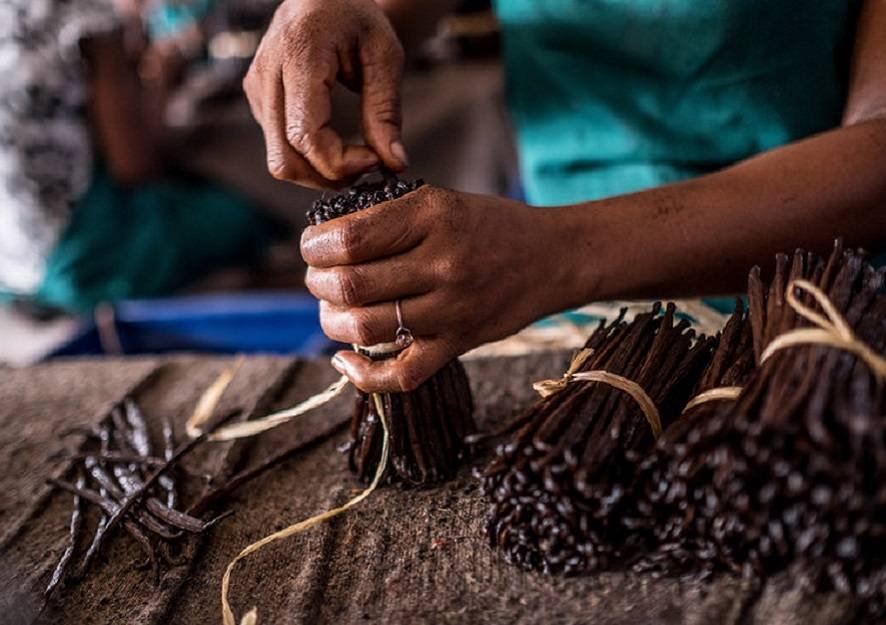Vanilla essence is used to make a lot of desserts and though it may not seem a big deal to the average baking shop to purchase artificial vanilla flavors, big production companies like Unilever and Mars thrive on quality vanilla beans for their mass production. Madagascar is one of the world’s leading producers of vanilla and the trade of the beans has catapulted in recent years due to shortage.
As an orchard vine, vanilla grows on tree trunks and takes up to three years to bear fruits. Its cultivation is labor-intensive as each flower must be pollinated manually before its green fingerling pods will grow.
This traditional expertise is mastered by the farmers and passed down from generation to generation. Local artisanal ice cream makers patronize vanilla the most and although the Malagasy people do not use vanilla the way Ethiopians consume the coffee they produce and export, vanilla production in Madagascar is an irreplaceable cultural heritage.
Madagascar’s second-largest export is vanilla, and the country produces about 80% of the world’s vanilla. In recent years, small vanilla farmers in vanilla plantations in the northeast of Madagascar, where the plantations are mostly located, Sambava, Andapa, Vohémar, and Antalaha, are raking in a lot of cash because of the worldwide shortage and an increase in global demand.
Vanilla contributes up to five percent of the country’s GDP and more than 80,000 farmers across the country cultivate vanilla beans.
For years, vanilla was sold at $50 a kilo but since 2015, after the tropical cyclone Enawo hit, Madagascar lost a lot of its vanilla plantations, which meant a quarter of the global supply was destroyed.
Since that time, the prices of Madagascar’s vanilla got inflated, and went from $50 to between $400 and $600 a kilo, thereby creating employment for middlemen who negotiate deals between the local farmers and the international flavor companies. The beans are “cured” into extracts for big multinational companies like Unilever and Archer Daniels.
Many speculate the prices mostly increased because while the beans are hard to come by and demand is high, many poachers do not allow the beans to mature. Harvesting premature vanilla beans is now a very rewarding venture.
This is done by farmers mostly for fear of thieves raiding their farms, bad weather destroying their farms, or to beat their competitors to the market.
But if a farmer can wait to harvest mature or “cured” beans, the quality of those beans is preferable since that which gives vanilla its distinct aroma, vanillin, is higher. This is what sells well on the international market.
Farmers who previously farmed on a subsistence basis to run their households now have earned over $20,000 in the last four years, according to NPR. That is more than the average Madagascan civil servant has made in that time.
This new stream of income created a vanilla economy where farmers began living more “lavishly”, buying houses in town, financing other businesses with their vanilla earnings, investing in education for their children and buying off-road cars.
It is still hard to quantify the exact stream of income for these farmers because of the cash-in-hand nature of their business while there is no standardization by the state as well. However, it is estimated that farmers can earn in the region of hundreds of million dollars a year.
One interesting angle to this is that farmers keep the monies in containers under their beds and mattresses because there are no banks in the villages where monies can be deposited for safekeeping and investment. The rate of break-in crimes has unsurprisingly increased over the years and according to the Madagascan Central Bank, there are millions of euros concealed in the Sava region beneath mattresses.
It is important that the nouveau riche kept their monies safe. The next best thing they have are cooperatives supported by international flavor companies like Virginia Dare, and NGOs such as Positive Planet.
These cooperatives are helping build the financial capacities of the farmers in the villages and are gradually helping with infrastructural development such as building primary schools and health insurance for the locals.
Cooperatives would also want to ensure the farmers get their due from putting in all the hard work and scrape out the middlemen altogether who push up the price of vanilla for their own gain.

